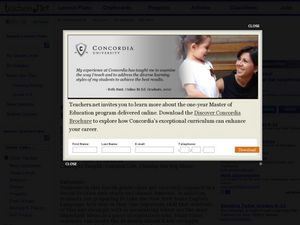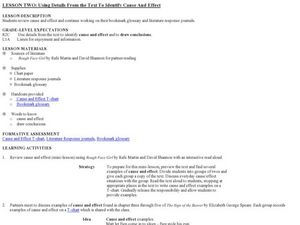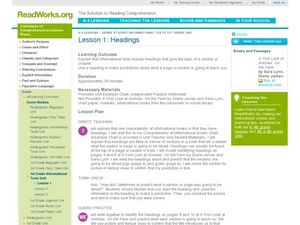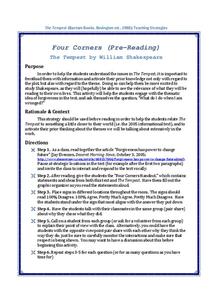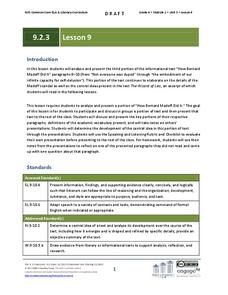Curated OER
Identifying Important Ideas in Expository Text
Students identify the main ideas from expository text. In this main ideas lesson, students read a piece of text and practice identifying what is most important. Students complete another sample reading with a group then discuss as a class.
Curated OER
Using Details From the Text To Identify Cause and Effect
Students word in groups to come up with cause and effect situations based on texts they are reading. In this cause and effect lesson plan, students record these in their literary response journals.
Curated OER
Headings
First graders discover how heading help us make predictions. The class discusses how informational text typically has heading that can aid them in determining what a chapter will be about. They read the heading and make predictions for...
Curated OER
Personal Information Sheet
Pupils access the material necessary to complete an employment application. They produce a personal data sheet, examine the information needed for job applications, and complete a generic application.
Curated OER
Informational Questioning
Learners practice writing basic questions to gain information. Working as a class, they identify questions they would ask to gain information about locations, time, and events. After writing their questions, they practice asking and...
Curated OER
Scanning Text
Students search for particular piece of information in text. They develop skills of looking for information and finding specific data without reading the whole text.
Curated OER
Information Safari
Students go to the library and research animals using features in the text to help them organize information. In this locating information lesson plan, students complete this task in teams.
Curated OER
Understanding Wikis and Ethical Responsible Posting of Information
High schoolers, using the Internet, post information about local attractions. They choose a topic and create a website. They review each others website and make comments on its content.
Curated OER
Sources of Information
Students review information from a previous instructional activity about JFK and his assassination. As a class, they identify sources they believe historians use and describe the difference between a primary and secondary source. In...
Maine Content Literacy Project
Introduction to Ernest Hemingway
What is a white elephant, and what does it have to do with Ernest Hemingway? Study "Hills Like White Elephants" in-depth by following the procedures outlined in this instructional activity, the fifth in a series of fourteen. Learners...
Bantam Books
The Tempest: Four Corners
Forgiveness can be a difficult step to take in any circumstance, but is it more difficult if the offense is more egregious? High schoolers consider the concept of forgiveness before reading William Shakespeare's The Tempest. As kids read...
Maine Content Literacy Project
Introduction to the Short Story
How should pupils read short stories? Set them up for this unit with an introductory lesson that goes over the main characteristics of a short story and starts learners off reading their first short story of the unit. In order to get a...
Dream of a Nation
Writing an Analytic Essay
After researching an issue introduced in Tyson Miller's Dream of a Nation: Inspiring Ideas for a Better America, writers develop an original thesis statement and craft an analytic essay using evidence collected in their research.
ReadWriteThink
Captioning the Civil Rights Movement: Reading the Images, Writing the Words
Scholars boost their knowledge of the Civil Rights Movement with a lesson plan that challenges writers, readers, and historians to analyze primary sources and caption their observations. By way of reading, writing, discussion,...
Channel Islands Film
First Contact: Lesson Plan 4 - Grades 5-6
After watching Treasure in the Sea, a documentary about Channel Islands National Park and the video First Contact, about the voyage of Juan Rodríguez Cabrillo to the Channel islands, groups research and then compare the experiences of...
EngageNY
Analyzing the Author’s Perspective: “The Shakespeare Shakedown”
Simon Schama's article "The Shakespeare Shakedown" allows young writers to see how authors respond to conflicting viewpoints. Class members participate in discussion appointments with five peers to explore the author's point of view.
EngageNY
Building Background Knowledge: The Dinka and Nuer Tribes Until the Mid-1980s (“Sudanese Tribes Confront Modern War” Excerpt 2)
Scholars continue making connections between the article "Sudanese Tribes Confront Modern War" and A Long Walk to Water by Linda Sue Park. They talk with partners to discuss how the article helps them understand a character's point of...
EngageNY
Grade 9 ELA Module 3, Unit 1, Lesson 7
Sometimes, the movie version of a book can provide additional details about the source material, particularly when the film is thoughtfully directed and well-acted. Ninth graders watch a two-minute clip from the movie Temple Grandin and...
EngageNY
Grade 9 ELA Module 2, Unit 3, Lesson 9
Are we interested in crime stories because we either identify with the victims or enjoy watching the rich suffer? Do we feel guilty and want someone to take our blame and let us feel innocent? Groups investigate how the author of "How...
Encyclopedia Britannica
Meta-Study: Political Brains
Are there differences in the brains of liberals and conservatives? That is the question young political scientists are challenged to answer. Class members examine studies, consider how the results are presented, and how the studies were...
EngageNY
Mid-Unit 3 Assessments, Part 2: Summarizing, Analyzing and Discussing Research
Why is reading important? As part of the mid-unit assessment, scholars read, summarize, and analyze an article about the importance of reading. Additionally, they continue their discussion about whether their rules to live by should be a...
Grand View Library
Grandview Newspaper
Get your young journalists above the fold with a set of lessons about newspapers. Kids focus on writing articles using the 5 Ws before creating a slide show presentation and blog entry to publish their writing.
EngageNY
Researching Facts
How did the 1906 San Francisco earthquake and fire affect the city's inhabitants? Scholars embark on a quest to discover the answer as they work in small groups to research articles about the event. They finish by completing a jigsaw...
Illinois Department of Natural Resources
Section Four: How Can We Protect Biodiversity?
Look into the future with a lesson plan on biodiversity and natural habitats. Learners read articles about different perspectives when it comes to planning future development, and decide which angle is the highest priority in a group...
Other popular searches
- Informational Text Features
- Informational Text Passages
- Teaching Informational Text
- Informational Text Structure
- Writing Informational Text
- Informational Texts Unit
- Informational Text Lesson
- Comprehend Informational Text
- Summarizing Informational Text
- Using Informational Texts
- Analyzing Informational Text
- Informational Text8rating=3


